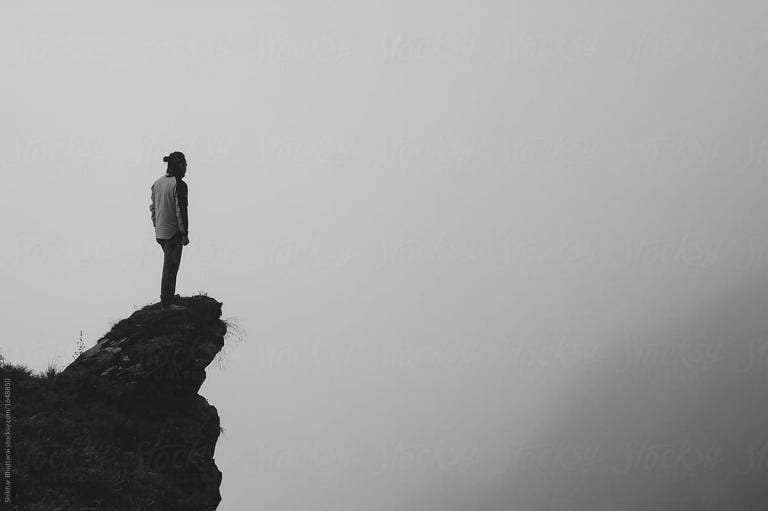
The main point of this post is the importance of continuing to work the edge of life-death with the keyword (e.g., 無, mu/no) even when it gets scary, even when it becomes a matter of letting go of life-death – that is, letting go of old fixed stances, of attachment to body-mind, and dropping body-mind. While digging into this point, though, a common issue arises – “I’m too dumb.” So I’ll address this issue as well, mixing it up with a little Wànsōng and Dōgen too.
First, though, you might want to know that this is the eighth of ten posts in this series on the keyword method as taught by its reputed founder, Dàhuì Pǔjué (aka, Dàhuì Zōnggǎo, 1089-1163). I’ll now share the usual series introduction and disclaimer:
In the recent translation of The Letters of Chan Master Dàhuì Pǔjué, translators Jeffrey L. Broughton and Elise Yoko Watanabe offer nine themes, motifs, that emerge in the letters about how to do keyword practice (話頭 huàtóu, Japanese, watō). I’ve been sharing them on the Vine of Obstacles: Online Support for Zen Training for students working with keywords (e.g., mu), and I’ll also be sharing them here for others who might be interested. Close study of an ancient text can help both students and teachers notice details of the method and refresh their practice spirit. If you are working with a keyword with another teacher, consult with them, of course, and rely on their guidance.
Theme 7: You must keep pressing hard with the keyword no matter what
“A common exhortation in Letters of Dàhuì is ‘keep pressing hard.’ At the place where the ‘keyword-uncertainty’ mass is not yet smashed, one must go right up to the edge of the precipice—and over!
Comment: The limits of “hard”
First, the phrase that Broughton and Watanabe use, “keep pressing hard,” can be translated differently, and more in tune with experience. What they translate as “keep pressing hard” is composed of three characters: 崖 is precipice. 將 is wishing. 去 is to go. Mujaku Dōchū, an important commentator on Dahui’s letters, expresses the meaning of “keep pressing hard” like this: “A colloquialism: go on pursuing to the ultimate—an incisive examination of principle is like going right up to the edge of a precipice.” (2)
For those of us with a more delicate disposition, rather than “smashed,” 破, could be also be rendered as “broken” or even “disrupted.”
So Broughton and Watanabe’s rendition of Dàhuì’s phrase, “Just keep pressing hard at the point where the uncertainty is not yet smashed,” could also be translated, “Come to the edge of life-death right where the doubt block is not yet broken.” It is a place of full aliveness. Right there is the place to let it all go.
However, using only one style of engagement with the keyword, “hard,” for example, can quite easily play into and reinforce a default stance – “hard” as the one and only way. This actually tamps down the full aliveness of the edge of the precipice. The results of this “when you’ve only got a hammer, the whole world looks like a nail” approach in keyword practice just ain’t pretty. Instead, constant fine-tuning of our style of engagement is most intimate.
That doesn’t mean that going hard with the keyword is always the wrong style of engagement either. Indeed, when we first begin to settle, and our minds are topsy-turvey, a “hell-or-high-water” orientation can help turn the light around. After that, however, “hard” energy often doesn’t meet the subtlety and nuance of the moment.
Wànsōng plays with the issue like this:
“Probing pole in hand, wearing a grass cloak [to become invisible]. Sometimes binding a ball of silk into iron, sometimes wrapping a rock in brocade. Using the hard against the soft is one thing, but how is it when meeting the strong with the weak?” (3)
Comment: The limits of “dumb”
Broughton and Watanabe use letter “14. In Reply to Vice Minister Chen” for an example of Dàhuì pressing the point about working the edge of life-death, the portion quoted above. Early in his response, unquoted above, Dàhuì writes,
“Your letter informs me that ‘you want to give heed to this great matter, but your disposition is extremely dull-witted.’ If that were actually the case, I should have to congratulate you! The reason most of today’s members of the scholar-official class are incapable of comprehending this matter and decisively attaining release is simply because their disposition is too intellectually sharp and their knowledge excessive.” (4)
It is nice to know that the ancients also thought that that they were too dumb! It might also help here to know that Dàhuì himself was essentially a college dropout. He had begun the process to study for the civil service exams so that he too could have been a member of the scholar-official class, and quit, maybe feeling too dumb, and took up the Buddha Way instead. In his interactions with many of those whose letters comprise this collection, Dàhuì was, using Wànsōng’s words, meeting the strong (scholar-official class member in good standing) with the weak (college drop-out desperately turning to the Buddha Way).
Speaking of the scholar-official class, today many people who are attracted to Zen practice and the keyword method for awakening are intellectually oriented and prone to gather knowledge. And many of these folks (like me) also feel that they are too dumb, too blunt, too stupid. By the way, the character translated as dull-witted, dumb, blunt, or stupid, 鈍, also refers to the third of three abilities – superior, middling, and inferior.
So not only dull-witted, dumb, blunt, and stupid, but of inferior ability to boot!
Self-diagnosis is, of course, fraught with error. We are just as unreliable in accessing the depth of our own awakening as we are accessing the depth of our own stupidity. Some of my students believe they are too dumb for keyword practice despite having advanced degrees from prestigious educational institutions and have or have had successful careers. As a student who sometimes thinks she’s too dumb very smartly observed, “We often compare our insides to others’ outsides.”
Dàhuì’s strategy for helping our friend, the recipient of letter #14, Vice Minister Chen, through his self-deception is to first congratulate him – thinking that you’re dumb is really smart! Then he challenges Chen to turn the light around. If you are smart enough to turn the light around to illuminate your dullness, is this smart or dull?
Dàhuì then encourages Chen to be even dumber, in the same manner that I noted in the previous post. “Taking a first in the ‘dull-witted examination,’ says Dàhuì, “is no bad thing!” (4) This kind of banter, I suspect, was intent on destabilizing Chen, or helping him lighten up a tad, such that he could appreciate the important point:
“If you merely come to know that the mind of the single substance and of non-duality definitely does not lie in sharp and dull, seizing and discarding, then you will see the moon and forget the finger [pointing at the moon], decisively severing at the single stroke of the sword.”
That’s just like Dōgen
In “Fukanzazengi,” Dōgen’s finger-pointing-at-the moon touches on some of the same points Dàhuì makes above – the nondual way is neither sound nor color, neither sharp nor dull:
“Awesome presence is certainly outside sound and color. How could this not be a standard prior to awareness and perceptions? This being the case, regardless of highest intelligence or lowest stupidity, do not choose the sharp person or the one who is dull-witted. Wholehearted effort precisely distinguishes the way. Cultivating verification is naturally not tainted with defilement. Bend your interest to be even more ordinary.” (5)
Dōgen adds a nice twist – don’t identify with or choose either being smart or dumb. Just wholeheartedly turn the light around. “Suddenly you’ll be ready to stake your life on one throw—done!”
The completely ordinary person lacks nothing of the true dharma eye.
(1) The Letters of Chan Master Dàhuì Pǔjué, “Introduction: Recurring Motifs in Huatou Practice,” trans. Jeffrey L. Broughton and Elise Yoko Watanabe. Modified.
(2) Op. Cit., footnote 36.
(3) Wànsōng Yělǎo, “The Record of Going Easy,” Case 14: Attendant Kuò Passes Tea, trans. Dosho Port.
(4) Broughton and Watanabe, “14.1: Contrary to what is expected, Dahui praises Chen’s dull faculties.”
(5) Eihei Dōgen, “Fukanzazengi,” (“General Advise for the Zazen Ceremony”), trans. Dosho Port.
Dōshō Port began practicing Zen in 1977 and now co-teaches with his wife, Tetsugan Zummach Sensei, with the Vine of Obstacles: Online Support for Zen Training, an internet-based Zen community. Dōshō received dharma transmission from Dainin Katagiri Rōshi and inka shōmei from James Myōun Ford Rōshi in the Harada-Yasutani lineage. Dōshō’s translation and commentary on The Record of Empty Hall: One Hundred Classic Koans, is now available (Shambhala). He is also the author of Keep Me In Your Heart a While: The Haunting Zen of Dainin Katagiri. Click here to support the teaching practice of Dōshō Rōshi.












